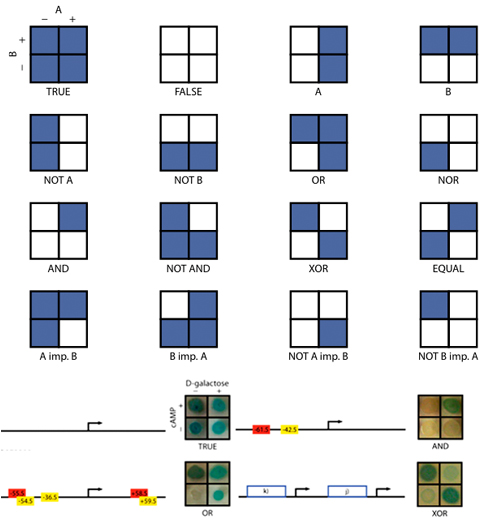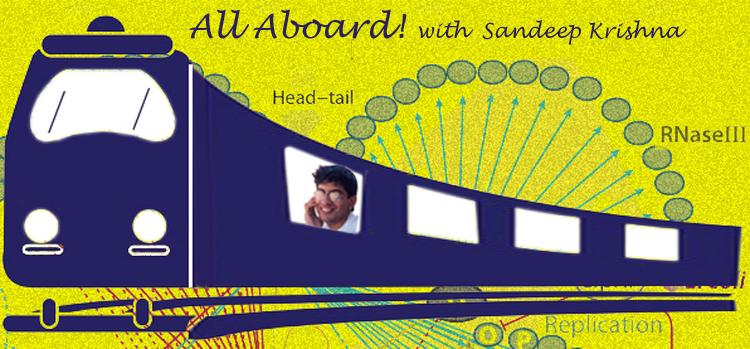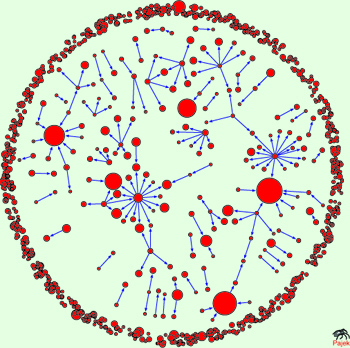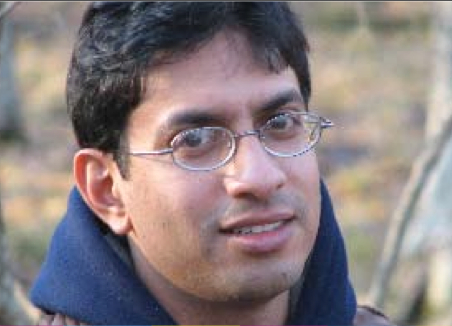All Aboard! with Sandeep Krishna
Sandeep Krishna recently joined the NCBS faculty. As playful and fun to talk to as he professes to be below, he agreed without hesitation to take part in a hypothetical discussion. This is the set-up: Sandeep has just boarded a train to Chennai and, taking his seat, he finds himself next to the sharp-minded matriarch of the Bhatia dynasty, Mrs Lakshmi Bhatia. She has a vast reservoir of disposable cash and is eagerly looking for worthwhile projects to finance. Let's eavesdrop on their conversation as they watch the dry and dusty southern Indian landscape roll by...
So Sandeep, please tell me about this research that you do in Bangalore.
Sandeep: Sure. I do a lot of theoretical work. I'm interested in what one could call basic science, not that I think there is a sharp line between basic and applied research. We are trying to understand phenomena at many different scales, the way that organisms function, how they are built, why they are built that way, how they manage to interact with the environment. More specifically, I focus on cells and information: how do cells get information about their environment, how do they deal with, and make decisions based on, all this information? We know that there are regulatory networks that determine these decisions, I want to understand the principles that govern the operation and evolution of those networks.
Sounds like the business world!
Sandeep: Yes, well even for a cell, living is a pretty complex business! There are many things they need to make sure they are doing correctly. They need to reproduce, they have to compete with other things that may be using the same resources, they need to know how to behave best in a complex environment. There are things you can control, things you can't control.
Very much like business!!
Sandeep: Yes. Another area I'm interested in is single-celled organisms that work as teams. We are quite used to this idea in multi-celled organisms, but it is becoming more and more clear that even single cell organisms often communicate with each other. Many bacteria do this: they switch to a more social style of existence when their population density reaches a certain level. I'm interested how they make these decisions, that are basically based on the crowdedness of their situation.
When I'm tackling all these sorts of questions, I'm using tools from my background, which is in physics. So I'm using lots of modelling and computation.
In the past, I've always found that projects seem to work best when the work keeps the person doing it happy. Are you going to be happy in this line of work?
Sandeep: Well I definitely enjoy what I do. If you need proof that I'm happy, just come to my office, you will find it's very messy - the sign of a happy man! Most of what I do is fairly playful. The elements of play and serendipity are very important for me. A lot of the projects I've been involved with have come about simply out of pretty random conversations. I hear about some phenomena that I get excited about. I enjoy having conversations with biologists where there is no agenda - just sitting around and having fun, playing with ideas. At some point in these discussions you sometimes get to a point where you feel you can ask a specific question about the topic: What would happen if I put this piece and that piece together, and how would it work? I can actually go on the computer and start making a little model. It's quite fun to build these models and then try to understand what are the questions to ask.
Did you like to build things when you were a child?
Sandeep: I used to play a lot with Lego when I was small. Mostly spaceships, if I remember right. It's only much later I started building computer programs. Actually, initially I was only interested in playing games on my Commodore 64, but then it broke down and there was no way to get it repaired in India in those days. So I finally started looking at these programming books my parents had bought for me. For the next couple of years I built programs in my head and tested them with pen and paper. If that computer hadn't been broken for those two or three years I may never have learnt how to think algorithmically!
Interesting!

The top blue and white boxes show all 16 theoretical possibilities for the Boolean-type integration of two input signals. Sandeep's student Alexander Hunziker made molecular versions of these, in Szabolcs Semsey's lab, using various combinations of binding sites (yellow and red boxes) and promoters (arrows) taken from the E. coli galactose regulatory network.
Sandeep: Another wonderful by-product of being a theorist is that you can work on many different things. The timescales of working on theoretical problems are often weeks to months, not years. So I can work on many different aspects of one phenomenon, or different phenomena. I can work on ecological models, sub-cellular processes, I can work on whatever I feel like at the time. I can change directions very quickly, pick up on things that I learn. And biology is almost inexhaustible in the things you can look into. We seem to be at a stage now where we are just starting to pick at the edges of general principles in a broad range of biological phenomena. We dont know if the biological principles we discover in the future will have the breadth of some of the laws of physics, but it is exciting to look for patterns and connections. It's also fun to take up the challenge of convincing experimental biologists that theoretical approaches can also lead to important insights. Not all of them believe that.
Can you learn from failure?
Sandeep: Indeed. I think in science it's often the things that seem like a failure that are really the most interesting. My then-Phd student, Alexander Hunziker did a study recently, with a biologist friend Szabolcs Semsey and his lab, in which he designed 12 different molecular "logic gates". It was the biological equivalent of building an integrated circuit, where it's transistors that do all the work, providing gates that carry out the various functions: AND, OR and NOT, and so on.
Ah yes, my son did all that in his computer programming courses.
Sandeep: Our system was very simple, it just had two inputs, each of which could be ON or OFF, but that leads to sixteen logically possible combinations that can regulate the output. We were able to recreate all but 4 of them. But our "transistors" did not work at all like we imagined: The AND gate worked like the OR gate, the OR gate worked like another gate, it was totally haywire. So there is something very amiss in the way we think about how the building blocks we used interact with each other. So that leads to many interesting questions, that we can now tackle.
I have always thought you could tell a lot about a person from their heroes. Who are yours?
Sandeep: Well, there are some people whose work and personality I admire, in some sense, but I'm reluctant to say that anyone is a hero. Maybe that says something about me, I'm not really inclined to having idols. Not even as a kid, not that I remember. There are a lot of really interesting personalities who have done great work in physics and biology, and I know about them, but I don't feel like copying anyone. Or even that I am capable of copying anyone! I'm more inspired by the world itself than any specific people. But don't get me wrong, I actually have the most fun when I'm thinking about a problem along with someone else, bouncing ideas around. So the people who are around me right now, my colleagues, end up being much more influential than any historical figures.
I have quite a few grandchildren. When they get to my age, is there any way that your work might have changed their lives?
Sandeep: That's interesting. Essentially, I don't know. I certainly think that there is a lot of value in trying to do basic research, to understand phenomena. And this type of knowledge in the past has resulted in many positive applied outcomes, helping to cure diseases, and so on. But equally there's no guarantee that the ideas that come out of basic science will always be used in a benign fashion: someone might use them to design some new biological weapon, who knows. It is hard to say where basic understanding will flower, and one has to keep a sharp eye on how things we discover are used. Humans are always surging ahead, applying biological technology to things that they really do not understand, manipulating the genomes of organisms, etc.
A better understanding of basic biological processes should definitely put us in a better position to make decisions about these applications. From another perspective, I think there is some value in doing these things for their own sake, this is what you do from when you are a kid. I don't feel motivated to do my research only by the possibility of any application. Part of the secret of doing basic science is not to think too much about the future, but to keep an eye on it!I really liked that movie, A Beautiful Mind, where the mathematics genius John Nash is studying game theory, and comes up with ideas that had major implications for global economics. You are looking at general principles of complicated systems. Can you see your work exploding into some bigger sphere of ideas?
Sandeep: I can definitely imagine it! I don't know whether it will actually happen. Again it's one of those things that's exciting to think about, but it is hard to bet for or against. I think there are a lot of people who think that theory can revolutionize biology, and perhaps as many people who think it's a load of crap! Excuse my language. But I definitely feel it will change biology, the way we think. And I think it has a lot to do with finding the right language to speak about biological phenomena. It will help us create a framework to talk about biology, to talk about patterns at different scales of time and size. How does what happens at the population level interconnect with events at the molecular level? I do feel that something very new and interesting is around the corner.
One exciting direction is thinking about things more in terms of information. Not that this is new in itself, people have been thinking about organisms in terms of information processing for a long time. But now it seems possible to use this approach in a more concrete way.
So you're tempting me. Just say I can give you five million. What are the first things you will do?
Sandeep: Well I'm not sure I need five million! That's one of the nice things about being a theorist, you don't necessarily need much. I can get by with fairly modest means. I need a few computers, some pens and paper, and access to a library of some type. But what I really need, and which is hard to put a monetary price on, is just good people to talk to, who are also interested in seeing things from a theoretical perspective. So my most valuable resource is people, and you can't buy them. So with five million I would buy a few computers and then I wouldn't know what to do. One of the good features of theoreticians is...we're cheap!
I'm not against frugality.
Sandeep: I guess one of the things one could do in a systematic way, and I think NCBS is already doing this, is to set up a critical mass of theoreticians, and also have lots and lots of visitors. A continual flux of people with diverse interests, talking and interacting with the group. Visitors could be short- and long-term, there could be student exchanges. We're also setting up a comprehensive set of courses that aim to educate students of diverse backgrounds in theoretical and computational approaches to biology. We're hoping all this will create a wonderful, open atmosphere, with lots of ideas being explored and a strong interaction between theorists and experimentalists. If it works, that would be a great use of the money.
You're obviously a man of many talents. Just say this whole biology thing does not work out, what then?
Sandeep: I can certainly speculate that theoretical approaches to biology might not go as well as we hope. That's no problem! There's lots of interesting things happening. The sorts of dynamical systems I'm fascinated by, you see those in many other situations too. For example, how currents circulate in the ocean, or economic and social systems, they are also very complex. So if we can discover some general principles governing all these complex interacting systems, we could apply that knowledge to a lot more than just biology. And apart from the disciplines I've just mentioned, there are lots of questions in physics that are also very interesting. There is so much we do not understand about certain materials. I guess you could say that for me, biology is indeed the most interesting arena in which to study the sorts of questions I like, but it's not the only one! There would be plenty of things for me to do for the rest of my life. In fact, right now, that's more the real issue - there's too many things I would like to work on.



Comments
I Love ur
Well spotted Manhar! It's
HI Dr Sandeep nice to see
Post new comment